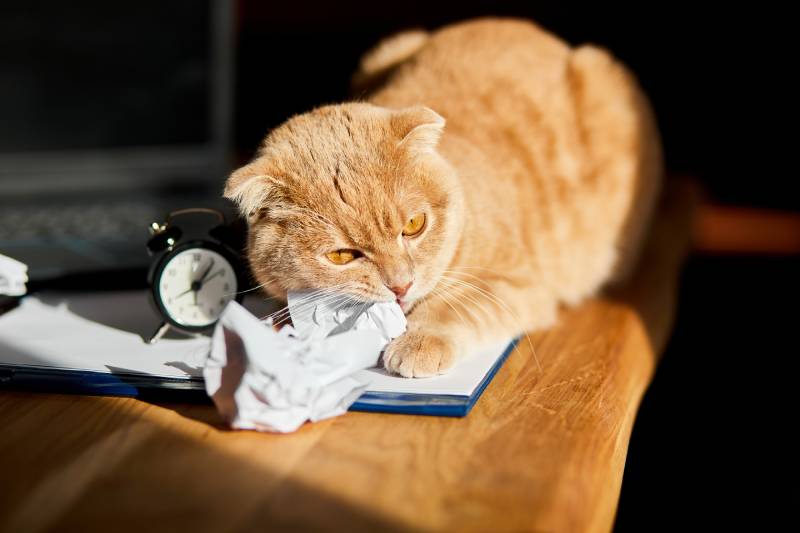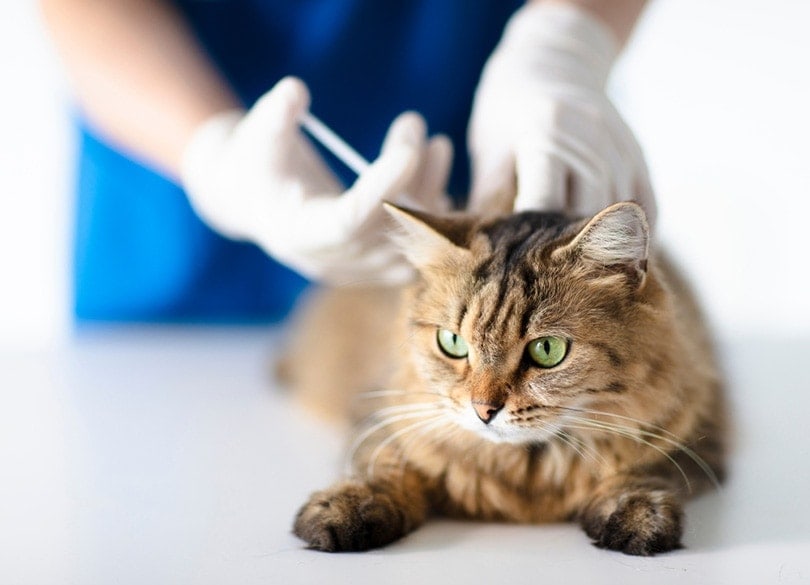Can Cats Eat Eggplant? Vet-Reviewed Nutritional Facts & FAQ

Updated on
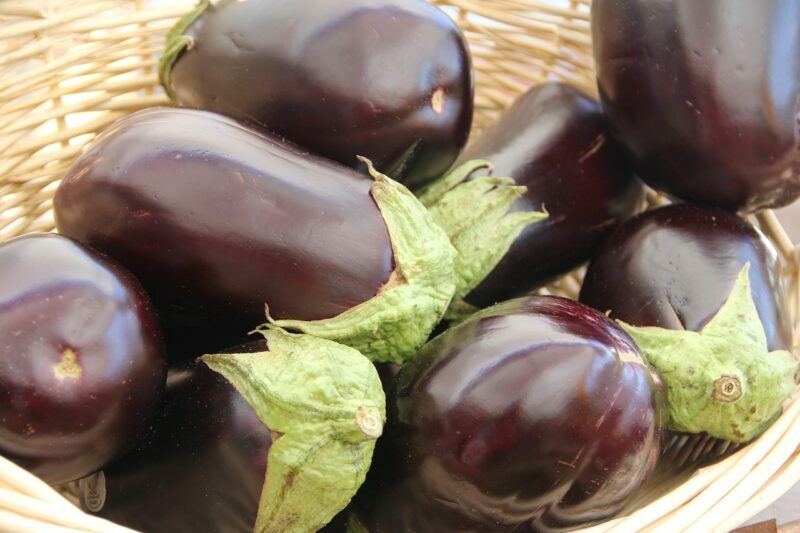
When we enjoy a particular food, we naturally want to share it with someone we love. If you are partial to eggplant, you might wonder if it’s something you can safely share with your cat. Unfortunately, your cat shouldn’t eat eggplant. It contains solanine, which is toxic in large amounts and causes neurological and digestive problems. We’ll discuss how dangerous eggplant is to cats and what you should do if your pet consumes a large portion.
Is Eggplant Bad for Cats?
Not all cats will be affected by the solanine in eggplant, which means if they ingest a little bit, they will be perfectly fine. However, large quantities of eggplant can be harmful. Eggplant is also high in fiber, and cats being obligate carnivores, don’t generally eat lots of vegetables and fruits, so their systems are not equipped to digest them properly.
The solanine in eggplant is present in all parts of eggplant (the seeds, flesh, and leaves.) It also contains oxalic acid, which isn’t poisonous but can be harmful as it bonds with the calcium in the blood and forms calcium oxalate crystals. The crystals can cause urinary tract issues when deposited in the kidneys and bladder.
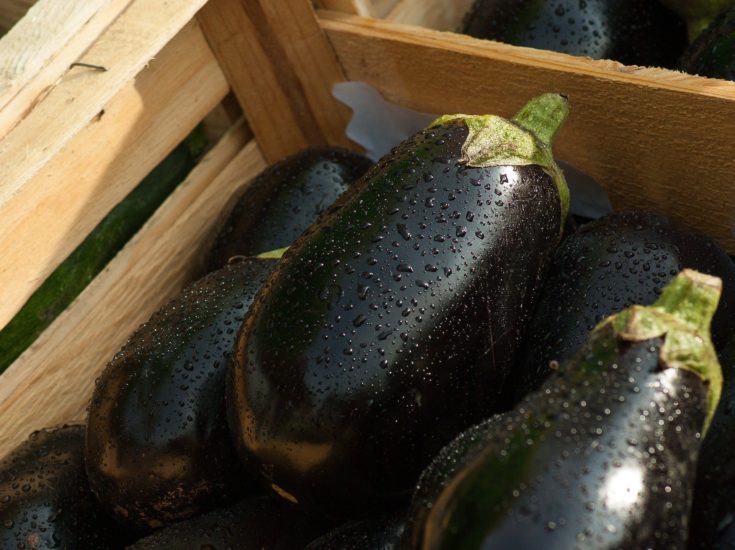
What Can Happen if Your Cat Eats Eggplant?
The result of eating eggplant will vary depending on a few factors, like your cat’s health, age, breed, and how much was eaten. Solanine poisoning affects kittens and smaller cats more than adult cats or larger breeds because they need to ingest relatively less for it to cause an issue.
- Abdominal pain
- Vomiting
- Dehydration
- Diarrhea
- Drooling
- Fatigue
- Fever
- High or low heart rate
- Inappetence
- Nausea
- Seizures
- Shortness of breath
- Slow reflexes
- Throat irritation
- Unusual behavior (for example, aggression or being withdrawn)
- Constipation
What Should You Do if Your Cat Eats Eggplant?
If you enjoy eggplant, and have an inquisitive cat- it’s a good idea to prepare yourself for the possibility that your cat could eat some. As careful as we are around our pets, accidents can happen. It’s important to note that you don’t have to wait for any signs to present; if you notice your cat eating eggplant, take them to the vet.
You must give your vet all the relevant information so they can diagnose and treat your cat to the best of their ability. This includes telling them how long ago the eggplant was ingested, how much, which signs you’ve noticed, and when they occurred.

Do Cats Need to Eat Fruit and Vegetables?
Cats don’t need fruit and vegetables to stay healthy; they should get all the nutrients they need from their complete, balanced cat food. Cats are also obligate carnivores, meaning they require nutrients only found in meat. Their metabolism and gastrointestinal tracts have adapted to eating meat and don’t digest plant material efficiently. Therefore, cats thrive on diets consisting primarily of animal-based protein.
Cats can eat some fruit and vegetables as treats, but they would very rarely eat them naturally and they shouldn’t be part of a feline’s regular diet. Citrus fruit, grapes, raisins, and persimmons should not be fed to cats because they can cause gastrointestinal problems, and when grapes and raisins are consumed, they can be toxic cats. Cats might not be very excited by vegetables, but if your feline likes the odd veggie snack, you can try serving carrots, steamed broccoli, peas, cucumber, or asparagus.
Fruit might not be a firm favorite because the texture can seem strange to a cat. Still, you can safely serve blueberries, bananas, peeled and deseeded apples, seedless watermelon, pumpkins, and cantaloupe for a boost of fiber, potassium, and vitamins A and C. Always introduce any new vegetable or fruit slowly and in moderation and make sure they don’t have any additional seasonings or flavorings.
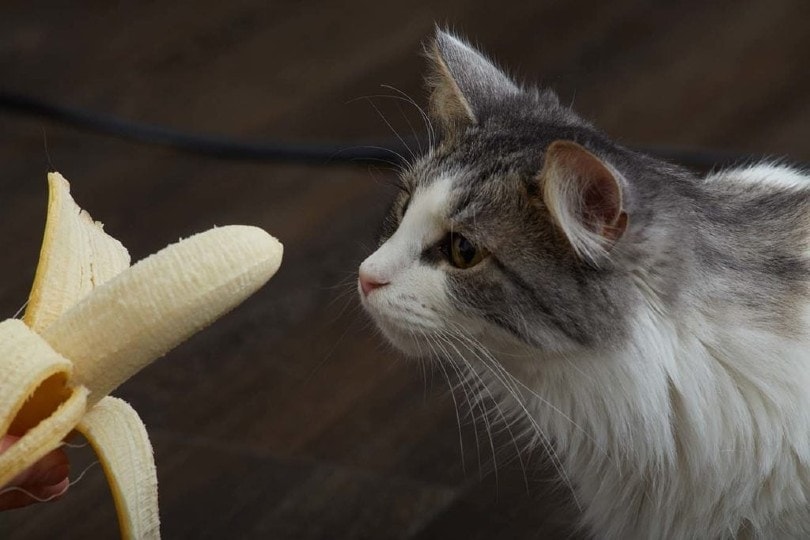
Final Thoughts
Unfortunately, you cannot share eggplant with that special kitty in your life. The main reasons are the solanine and oxalic acid, which present a high risk to your cat’s health. If you witness your cat eating eggplant or suspect they have, contact your vet.
The earliest signs that indicate your cat has ingested eggplant are vomiting and diarrhea but don’t feel like you need to wait for signs to appear before contacting your vet. The longer you wait, the more likely severe reactions, such as trembling, drooling, and respiratory problems, will occur.
Featured Image Credit: Srattigan, Pixabay


